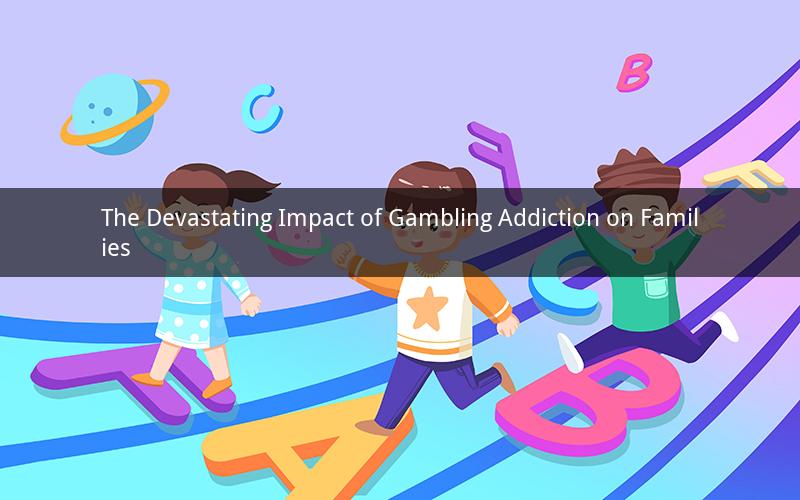
Gambling addiction is a severe issue that can have far-reaching consequences, particularly on the family unit. The addiction not only affects the individual but also has a profound impact on their loved ones. In this article, we will explore how gambling addiction affects families, the signs to look out for, and the steps that can be taken to help those affected.
1. Emotional and Psychological Impact on Families
The emotional and psychological impact of gambling addiction on families is immense. When a family member is struggling with this addiction, it can lead to a range of negative emotions, such as anger, frustration, sadness, and despair. Here are some of the ways in which gambling addiction affects families emotionally and psychologically:
a. Increased stress and anxiety: Family members may experience heightened stress levels due to the uncertainty of their loved one's addiction. This can lead to anxiety attacks, panic disorders, and other mental health issues.
b. Relationship strain: The addiction can put a strain on relationships, causing conflicts, misunderstandings, and even divorce. Trust issues may arise, and communication can break down, leading to isolation and loneliness.
c. Financial strain: Gambling addiction often leads to significant financial problems, which can put a burden on the family. This may result in debt, foreclosure, and even bankruptcy, causing additional stress and worry.
d. Guilt and shame: Family members may feel guilty for not being able to help their loved one or may experience shame due to the stigma associated with gambling addiction.
2. Economic Consequences
Gambling addiction can have severe economic consequences for families. The individual struggling with addiction may borrow money, sell assets, or even steal to fund their gambling habits. Here are some of the economic consequences of gambling addiction:
a. Debt: Accumulating debt is a common result of gambling addiction. This can lead to financial strain, stress, and even bankruptcy for the entire family.
b. Loss of income: The individual may miss work or be fired due to their addiction, leading to a loss of income for the family.
c. Divorce: Financial strain caused by gambling addiction can lead to divorce, further impacting the family unit.
3. Legal and Social Repercussions
Gambling addiction can also have legal and social repercussions for families. The individual may face legal issues such as fraud, theft, or even bankruptcy. Here are some of the legal and social consequences of gambling addiction:
a. Legal issues: The individual may face charges for theft, fraud, or embezzlement due to their gambling addiction.
b. Social stigma: Families affected by gambling addiction may face social stigma, leading to isolation and discrimination.
c. Loss of friends and family: The addiction may cause the individual to lose friends and family members who can no longer tolerate the behavior.
4. How to Help a Family Affected by Gambling Addiction
If you suspect that a family member is struggling with gambling addiction, it is crucial to take action. Here are some steps you can take to help the family affected by gambling addiction:
a. Educate yourself: Learn about gambling addiction, its signs, and the impact it has on families. This will help you understand the situation better and offer support.
b. Encourage professional help: Encourage your loved one to seek professional help from a therapist or counselor specializing in gambling addiction.
c. Support groups: Join a support group for families affected by gambling addiction. This can provide you with a sense of community and help you cope with the challenges you may face.
d. Financial assistance: If the family is facing financial difficulties, consider offering financial assistance or helping them find resources to manage their debt.
e. Maintain communication: Keep the lines of communication open with your loved one and other family members. This will help foster understanding and support.
Frequently Asked Questions
1. How can I tell if my loved one is struggling with gambling addiction?
You may notice signs such as secrecy, increased stress levels, financial difficulties, and changes in behavior. If you suspect your loved one is struggling with gambling addiction, it is essential to address the issue.
2. Can gambling addiction be treated?
Yes, gambling addiction can be treated. Professional help from therapists, counselors, and support groups can help individuals overcome their addiction.
3. How can I help my loved one recover from gambling addiction?
Encourage them to seek professional help, join support groups, and maintain open communication. Offer your support and understanding throughout the recovery process.
4. Can gambling addiction lead to legal issues?
Yes, gambling addiction can lead to legal issues, such as theft, fraud, or embezzlement, if the individual resorts to illegal means to fund their addiction.
5. How can I support my family during this difficult time?
Educate yourself about gambling addiction, offer emotional support, and help your loved one seek professional help. Join support groups to connect with others facing similar challenges.